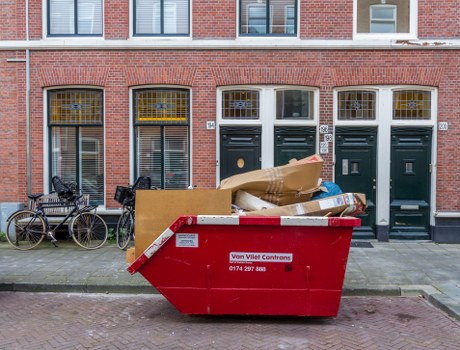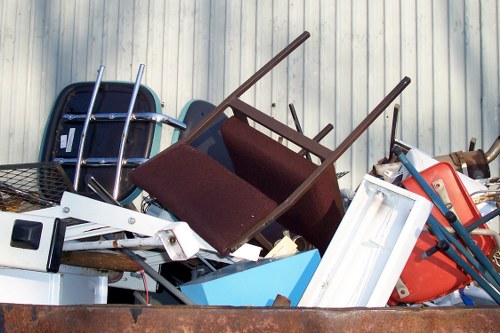House Clearance in Fridge Disposal

Understanding House Clearance
House clearance is an essential service for those looking to declutter their homes efficiently. Whether you're moving, renovating, or simply tidying up, clearing out old appliances like fridges can be a daunting task. Effective house clearance in fridge disposal ensures that your old refrigerator is handled responsibly, minimizing environmental impact.
Fridge disposal goes beyond just removing the appliance from your home. It involves the safe handling of hazardous materials, recycling of usable parts, and proper disposal of non-recyclable components. By opting for professional house clearance, you can rest assured that your fridge disposal is managed in compliance with local regulations.
Moreover, clearing out your fridge during a house clearance can free up valuable space, making your home more organized and functional. It's an opportunity to reassess your household items and reduce clutter, contributing to a more sustainable living environment.

The Importance of Proper Fridge Disposal
Disposing of a fridge improperly can have severe environmental consequences. Refrigerators contain harmful substances like Freon, which can damage the ozone layer if released into the atmosphere. Proper fridge disposal ensures that these chemicals are safely extracted and managed, preventing environmental pollution.
In addition to environmental concerns, improper disposal can lead to legal repercussions. Many regions have strict regulations regarding the disposal of large appliances. By engaging in house clearance in fridge disposal, you ensure that all legal requirements are met, avoiding potential fines or penalties.
Furthermore, professional disposal services often provide recycling options for parts of the fridge that can be repurposed. This not only reduces waste but also promotes a circular economy, where materials are reused and recycled, fostering sustainability.

Steps Involved in Fridge Disposal
Proper fridge disposal involves several critical steps to ensure safety and compliance. Here's a breakdown of the process:
- Assessment: Professionals assess the condition of the fridge to determine the best disposal method.
- Removal of Hazardous Materials: Refrigerants and other harmful substances are safely extracted and stored.
- Disassembly: The appliance is dismantled into recyclable and non-recyclable parts.
- Recycling: Usable materials like metals and plastics are sent to recycling facilities.
- Disposal: Non-recyclable components are disposed of in accordance with environmental regulations.
This structured approach ensures that every aspect of the fridge disposal is handled efficiently and responsibly.

Benefits of Hiring Professionals for House Clearance
Opting for professional services for house clearance in fridge disposal offers numerous advantages:
- Expertise: Professionals have the knowledge and experience to handle various types of fridges safely.
- Time-Saving: They can efficiently clear out your fridge, saving you valuable time and effort.
- Safety: Proper handling reduces the risk of accidents and exposure to hazardous materials.
- Compliance: Ensures adherence to environmental and legal standards.
- Recycling: Maximizes the recycling potential of your old fridge, promoting sustainability.
By entrusting your fridge disposal to experts, you can achieve a hassle-free and responsible clearance process.

Eco-Friendly Practices in Fridge Disposal
Embracing eco-friendly practices in fridge disposal is crucial for preserving our environment. Here are some sustainable approaches:
- Recycling: Separating recyclable materials such as metals, plastics, and glass for reuse.
- Safe Extraction: Properly removing and managing refrigerants to prevent environmental harm.
- Donation: If the fridge is still functional, consider donating it to organizations in need.
- Upcycling: Repurposing parts of the fridge for creative projects or alternative uses.
- Energy Recovery: Utilizing energy recovery methods to convert waste into usable energy.
Implementing these practices not only reduces waste but also contributes to a more sustainable and environmentally friendly community.
Choosing the Right Service for Your Needs
Selecting a reliable service for house clearance in fridge disposal is paramount. Consider the following factors:
- Reputation: Look for companies with positive reviews and a history of reliable service.
- Certifications: Ensure that the service is certified to handle hazardous materials.
- Pricing: Compare prices to find a service that offers good value without compromising quality.
- Efficiency: Choose a service that can clear out your fridge promptly and effectively.
- Customer Support: Excellent customer service ensures that your questions and concerns are addressed promptly.
By carefully evaluating these aspects, you can choose a service that best fits your house clearance needs.
Cost Factors in Fridge Disposal
The cost of fridge disposal can vary based on several factors:
- Condition of the Appliance: Functional fridges may be cheaper to dispose of or even eligible for pickup.
- Size and Weight: Larger and heavier fridges may incur higher disposal fees.
- Location: Disposal costs can vary depending on your geographic location and accessibility.
- Service Type: Full-service clearance, including removal and disposal, may cost more than simple pickup services.
- Recycling Fees: Fees associated with recycling hazardous materials can influence the overall cost.
Understanding these factors can help you budget appropriately and choose a service that offers the best value for your needs.
Environmental Impact of Fridge Disposal
Proper disposal of fridges significantly impacts the environment. Improper disposal can lead to:
- Air Pollution: Release of refrigerants like Freon can damage the ozone layer.
- Soil and Water Contamination: Leakage of toxic substances can pollute soil and water sources.
- Waste Accumulation: Non-recyclable parts contribute to landfill waste, increasing environmental strain.
Conversely, responsible disposal practices mitigate these negative effects, promoting a healthier ecosystem.
DIY vs. Professional Fridge Disposal
Deciding between DIY fridge disposal and hiring professionals involves weighing the pros and cons:
- DIY Disposal: While it may seem cost-effective, DIY disposal can be risky due to the potential mishandling of hazardous materials. It also requires heavy lifting and transportation, which can be physically demanding.
- Professional Disposal: Offers expertise, safety, and compliance with regulations. Professionals handle all aspects of disposal, from hazardous material extraction to recycling, providing a hassle-free experience.
For most homeowners, professional disposal is the safer and more efficient choice, ensuring that all components are managed appropriately.
Regulations and Compliance in Fridge Disposal
Fridge disposal is subject to various regulations aimed at protecting the environment and public health. Key compliance aspects include:
- Refrigerant Management: Proper handling and disposal of refrigerants to prevent ozone depletion.
- Waste Classification: Categorizing waste materials for appropriate disposal or recycling.
- Licensing: Ensuring that disposal services are licensed to handle hazardous materials.
- Reporting Requirements: Maintaining records of disposed fridges to comply with environmental laws.
Adhering to these regulations is crucial for responsible fridge disposal and maintaining environmental standards.
Tips for Preparing Your Fridge for Disposal
Proper preparation can streamline the fridge disposal process. Here are some tips:
- Empty the Fridge: Remove all food items and clean the interior to prevent odors and pests.
- Disconnect Safely: Unplug the fridge and ensure it is properly disconnected from power sources.
- Defrost: Allow the fridge to defrost to prevent water leakage during transportation.
- Secure Doors: Tape or secure the doors to prevent them from swinging open during removal.
- Remove Accessories: Take out shelves, drawers, and other removable parts for easier handling.
Following these steps ensures a smooth and efficient disposal process.
Recycling Options for Old Fridges
Recycling plays a pivotal role in responsible fridge disposal. Several components of fridges can be recycled:
- Metals: Steel and aluminum parts can be reclaimed and reused in various industries.
- Plastics: Certain plastic components are recyclable and can be repurposed.
- Glass: Glass shelves and panels can be recycled, reducing the need for new materials.
- Electronic Parts: Circuit boards and other electronic parts can be processed for material recovery.
By recycling these materials, we conserve resources and reduce the environmental footprint of appliance disposal.
Innovative Technologies in Fridge Recycling
Advancements in technology have enhanced the efficiency and effectiveness of fridge recycling:
- Automated Sorting: Modern recycling facilities use automated systems to sort materials quickly and accurately.
- Chemical Recycling: Processes that break down complex materials into their basic components for reuse.
- Energy-Efficient Recycling: Technologies that reduce the energy consumption of recycling processes.
- Advanced Extraction Techniques: Enhanced methods for safely extracting refrigerants and other hazardous materials.
These innovations contribute to more sustainable and environmentally friendly fridge disposal practices.
Environmental Benefits of Proper Fridge Disposal
Proper disposal of fridges yields significant environmental benefits:
- Reduction of Greenhouse Gases: Safe handling of refrigerants prevents the release of harmful greenhouse gases.
- Conservation of Resources: Recycling materials reduces the need for virgin resources, promoting sustainability.
- Decrease in Landfill Waste: Recycling minimizes the amount of waste sent to landfills, alleviating environmental strain.
- Energy Savings: Reusing materials saves energy compared to producing new materials from scratch.
These benefits underscore the importance of responsible fridge disposal in environmental conservation.
Health and Safety Considerations
Fridge disposal involves several health and safety considerations:
- Handling Hazardous Materials: Proper extraction and management of refrigerants and other harmful substances are crucial to prevent health hazards.
- Physical Safety: Removing large appliances requires careful handling to avoid injuries.
- Containment of Contaminants: Ensuring that any spills or leaks are contained to prevent contamination.
- Adherence to Safety Protocols: Following established safety guidelines to protect both workers and the public.
Addressing these considerations ensures a safe and secure fridge disposal process.
Economic Impact of Fridge Recycling
Recycling fridges has several economic implications:
- Job Creation: Recycling facilities provide employment opportunities in material processing and management.
- Cost Savings: Reusing materials reduces manufacturing costs for new products, benefiting consumers and industries.
- Resource Efficiency: Efficient recycling processes optimize resource use, contributing to economic sustainability.
- Market Development: Growth in the recycling industry stimulates market expansion and innovation.
These economic benefits highlight the value of investing in robust fridge recycling programs.
Future Trends in Fridge Disposal
The future of fridge disposal is poised to evolve with emerging trends:
- Smart Recycling Solutions: Integration of smart technologies to enhance recycling efficiency and accuracy.
- Circular Economy Models: Emphasis on designing products for longevity, reuse, and recyclability.
- Green Certifications: Increased adoption of eco-friendly certifications for disposal services.
- Consumer Awareness: Growing awareness about the importance of responsible appliance disposal.
- Policy Enhancements: Strengthening regulations to support sustainable disposal practices.
These trends are set to drive more sustainable and efficient fridge disposal methods in the coming years.
Conclusion
Effective house clearance in fridge disposal is a critical aspect of maintaining a clean, organized, and environmentally responsible home. By understanding the importance of proper disposal, leveraging professional services, and embracing eco-friendly practices, homeowners can significantly reduce their environmental impact while ensuring compliance with regulations.
Investing in professional disposal services not only ensures safety and efficiency but also contributes to the broader goal of sustainability through recycling and responsible waste management. As we move towards a more sustainable future, the principles of proper fridge disposal will continue to play a vital role in environmental conservation.
Contact us today to schedule your house clearance service and ensure responsible fridge disposal. Our team of experts is dedicated to providing efficient, safe, and environmentally friendly solutions tailored to your needs.
Frequently Asked Questions
- Responsible Fridge Disposal Options in Highgate
- Essential Guide to Responsible Fridge Disposal in Raynes Park
- Effective Fridge Disposal Strategies in West Brompton
- Ultimate Guide to Fridge Disposal in Croydon
- Essential Guide to Fridge Disposal in Bow
- Essential Guide to Fridge Disposal in South Harrow
- Essential Fridge Disposal Services in Grange Park
- Efficient and Eco-Friendly Fridge Disposal in Upper Norwood
- Effective Fridge Disposal Solutions in Bickley
- Effective Methods for Fridge Disposal in Marks Gate
- Effective Fridge Disposal in West Kensington
- Ultimate Fridge Disposal Guide for Bloomsbury Residents
- Responsible Refrigerator Removal Services in Crews Hill
- Responsible Fridge Disposal in Harrow: Your Complete Guide
- Your Guide to Responsible Fridge Disposal in Tottenham Hale
- Responsible Fridge Disposal in Hornchurch
- Your Ultimate Guide to Fridge Disposal in Gants Hill